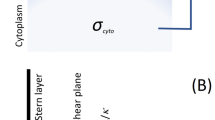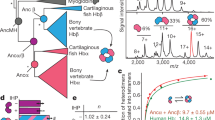Abstract
IN most types of cells the protein constituents of the cytoplasm are constantly being degraded and synthesised1–6. When the proteins in these cells are labelled with a protein precursor, the label disappears from the protein with first order kinetics. The amount of any protein in the cell then is regulated by the rate of its synthesis and degradation, and recent work indicates the importance of this process as a regulatory mechanism in mammalian cells. In contrast, when haemoglobin, which comprises 90% of the protein of the mature mammalian erythrocyte, is labelled, it does not decay with first order kinetics, but survives for a finite period. It disappears from the vascular bed when the intact erythrocyte is removed from circulation. Thus, haemoglobin labels provide excellent material for studies of the life span of the red cell.7
This is a preview of subscription content, access via your institution
Access options
Subscribe to this journal
Receive 51 print issues and online access
$199.00 per year
only $3.90 per issue
Buy this article
- Purchase on Springer Link
- Instant access to full article PDF
Prices may be subject to local taxes which are calculated during checkout
Similar content being viewed by others
References
Schimke, R. T., and Doyle, D., A. Rev. Biochem. 39, 929 (1970).
Schmike, R. T., J. Biol. Chem., 239, 3808 (1964).
Swick, R. W., J. biol. Chem., 231, 751 (1958).
Rechcigl, M. M., in Enzyme Synthesis and Degradation in Mammalian Systems, 236 (University Park Press, Baltimore, 1971).
Dice, J. F., and Schimke, R. T., J. biol. Chem., 247, 98 (1972).
Hehlinger, P. J., and Schimke, R. T., J. biol. Chem., 246, 2574 (1971).
Berlin, N. I., Waldman, T. A., and Weissmann, S. M., Physiol Rev., 39, 577 (1959).
Sears, D. A., and Weed, R. L., Blood, 34, 376 (1969).
Krivit, W., J. Lab clin. Med., 78, 656 (1972).
Hughes Jones, N. C., Clin. Sci., 20, 315 (1961).
Phillips, D., and Morrison, M., Biochem. biophys. Res. Commun., 40, 284 (1970).
Phillips, D., and Morrison, M., FEBS Lett., 18, 95 (1971).
Phillips, D., and Morrison, M., Biochemistry, 10, 1766 (1971).
Hughes Jones, N. C., and Cheney, B., Clin. Sci., 20, 323 (1961).
Recommended Methods for Radioisotope Red Cell Survival Studies, International Committee for Standardization in Hematology, Blood, 38, 378 (1971).
Renweir, D., and Durrer, H. A., Hormone Metab. Res., 4, 213 (1972).
Morrison, N. L., and Neurath, H. J., J. biol. Chem., 200, 39 (1953).
Moore, G. L., Kocholaty, W. F., Cooper, D. A., Gray, J. L., and Robinson, S. L., Biochim. biophys. Acta, 212, 126 (1970).
Cooper, R. A., and Jandl, J. H., in Hematology (edit. by Williams, W. J., Beutler, E., Erslev, A, J., and Rundles, R. W.), 17 (McGraw-Hill, New York, 1972).
Author information
Authors and Affiliations
Rights and permissions
About this article
Cite this article
MORRISON, M., MICHAELS, A., PHILLIPS, D. et al. Life span of erythrocyte membrane protein. Nature 248, 763–764 (1974). https://doi.org/10.1038/248763a0
Received:
Revised:
Issue Date:
DOI: https://doi.org/10.1038/248763a0
This article is cited by
-
Identification of differences between the surface proteins and glycoproteins of normal mouse (Balb/c) and human erythrocytes
The Journal of Membrane Biology (1979)
Comments
By submitting a comment you agree to abide by our Terms and Community Guidelines. If you find something abusive or that does not comply with our terms or guidelines please flag it as inappropriate.



